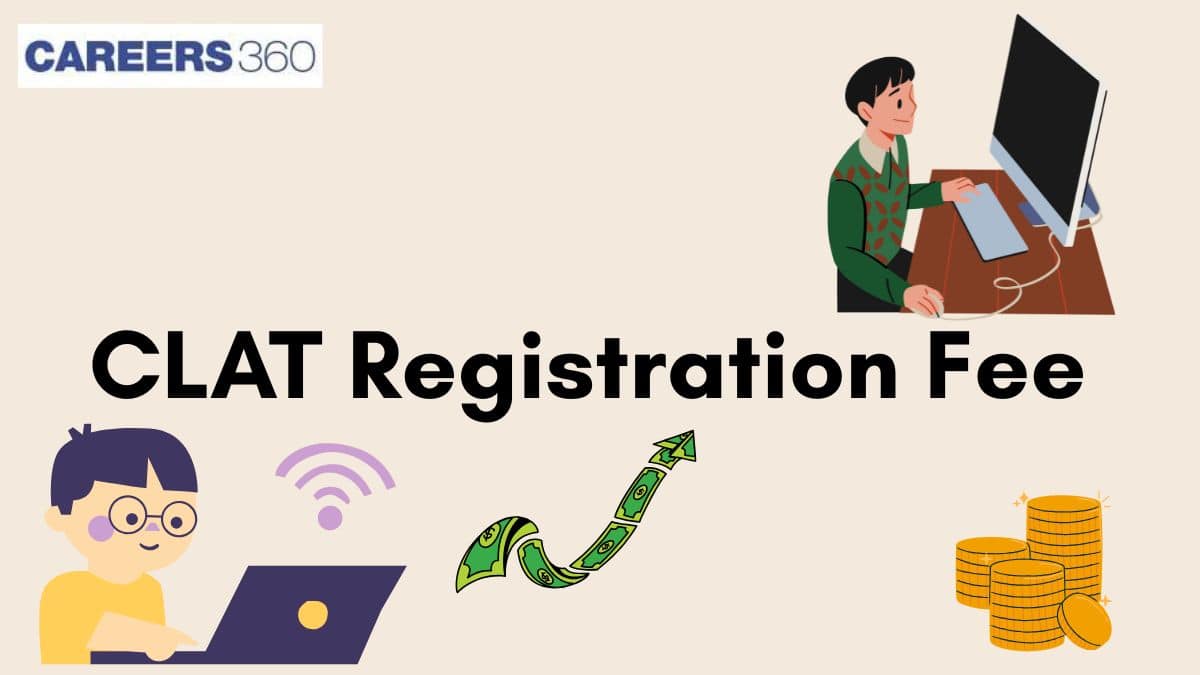Jindal Global Law School Admissions 2026
Ranked #1 Law School in India & South Asia by QS- World University Rankings | Merit cum means scholarships | Early Admissions (Pahse 2) Deadline: 28th Feb’26
CLAT Registration Fee 2026: The Consortium of National Law Universities (NLUs) will notify the CLAT 2026 registration fees in the CLAT 2026 notification. The registration fee of CLAT 2026 for general and OBC candidates is Rs 4000. Candidates from SC/ST/PwD and BPL categories have to pay the CLAT 2026 application fee of Rs 3500. The CLAT registration fee must be paid online. The consortium will open the CLAT 2026 registration on August 1, 2025. Students seeking to appear for the CLAT 2026 exam must register before October 31, 2025.

Payment of the CLAT 2026 registration fee is an integral part of the application process. Candidates who will successfully make the CLAT 2026 application fee payment will get a payment confirmation receipt. Read the article to get information about the CLAT application fee 2026, steps to make payment, confirmation receipt and more. The Common Law Admission Test will be conducted on December 7, 2025. CLAT 2026 will be conducted for admission to 24 participating national law universities, IIULER Goa and over 60 affiliated colleges.
Category | Fee | Mode of payment |
|---|---|---|
General/ OBC/PwD/NRI/PIO/OCI category | Rs. 4,000 | Online: Net Banking Credit Card Debit Card |
SC/ST/BPL category | Rs 3,500 |
Also check - CLAT Syllabus
The CLAT application fee 2026 will be paid in online mode only. Once the applicant has completed the registration, filling in the detailed application form, uploading documents, and adding NLU preferences, test centre preferences, they can move on to the final step of the application process - payment of the registration fee. The CLAT 2026 registration fee can be paid through UPI, net banking, credit card or debit card. The CLAT application fee 2026 can be paid through the following methods.
The payment of the CLAT registration fee through UPI can be done through mobile. On the registration fee payment page, candidates must click on the UPI option. Next, candidates will have to enter their UPI ID or scan the QR mode given on the screen. Then, candidates will have to open their UPI app linked with their UPI ID on their mobile and make the required fee payment.
You may also check:
| HPNLU Shimla Admissions |
| DNLU Jabalpur Admissions |
| NLU Mumbai Admissions |
| NLU Nagpur Admissions |
| NLU Cuttack Admissions |
Ranked #1 Law School in India & South Asia by QS- World University Rankings | Merit cum means scholarships | Early Admissions (Pahse 2) Deadline: 28th Feb’26
Among top 100 Universities Globally in the Times Higher Education (THE) Interdisciplinary Science Rankings 2026
To make the CLAT 2026 application fee payment through credit card or debit card, they must select the credit card/debit card option on the payment page. Next, candidates need to enter their debit card/ credit card number, expiry date and CVV in the given boxes. Candidates will then have to initiate the further payment process according to their card and banking provider.
Another option for CLAT application fee payment 2026 is net banking. To make their payment through this payment method, candidates must select the ‘net banking’ option. Next, candidates will be required to log in to their net banking account and make the payment.
Candidates who fill out the CLAT 2026 application form are advised to keep the payment receipt with them for future reference. The payment confirmation receipt will also be available in the CLAT candidate portal.
You may also check:
Frequently Asked Questions (FAQs)
General category candidates need to pay a fee of Rs 4,000.
The registration fee for SC and ST category is Rs 3,500.
Candidates will be required to pay the CLAT 2026 application fee only in online mode.
On Question asked by student community
Since you have not specified your category, I will answer for all categories. A CLAT rank of 38169 (typically 40-45 marks) makes admission to top NLUs difficult. For General candidates, chances are nil. Even for OBC, SC, and ST categories, admission is primarily possible only through state domicile quotas or
After the CLAT results are declared, candidates participate in a centralised online counselling process managed by the Consortium of NLUs. Eligible candidates register on the official portal, submit their NLU preference list , and pay a counselling fee. Seat allotment happens across multiple rounds based on rank, category, and preferences,
Hi, you can apply for admissions in Nirma University, NFSU Ahemdabad, Alliance, IPU University and affiliated instiutes (in case you are reserved category candidates), UPES Dehradun, BITS Law School etc.
Start preparing for CLAT by first understanding the exam pattern and syllabus, which includes English, Current Affairs, Legal Reasoning, Logical Reasoning, and Quantitative Techniques. Make a simple daily routine and begin with basics read newspapers regularly for current affairs, practice comprehension passages for English and legal sections, and solve basic
Hello,
With a CLAT AIR of 33599 and SC category rank of 2103, and being a Delhi domicile, your chances at IP University (GGSIPU) are moderate to good, especially in later counselling rounds.
Based on previous year trends, some IPU-affiliated law colleges have closed at higher SC category ranks, so
Among top 100 Universities Globally in the Times Higher Education (THE) Interdisciplinary Science Rankings 2026
NAAC A+ Accredited | Among top 2% Universities Globally (QS World University Rankings 2026)
Excellent curriculum; an impressive range of electives, besides core law courses. Up to 100% merit scholarship on a first-come, first-served basis
Moot Court | Mock trials | Legal Aid Clinic
Admissions open for B.A. LL.B. (Hons.), B.B.A. LL.B. (Hons.) and LL.B Program (3 Years) | School of Law, MRU ranked No. 1 in Law Schools of Excellence in India by GHRDC (2023)
NAAC A++ Accredited | Ranked #11 by NIRF